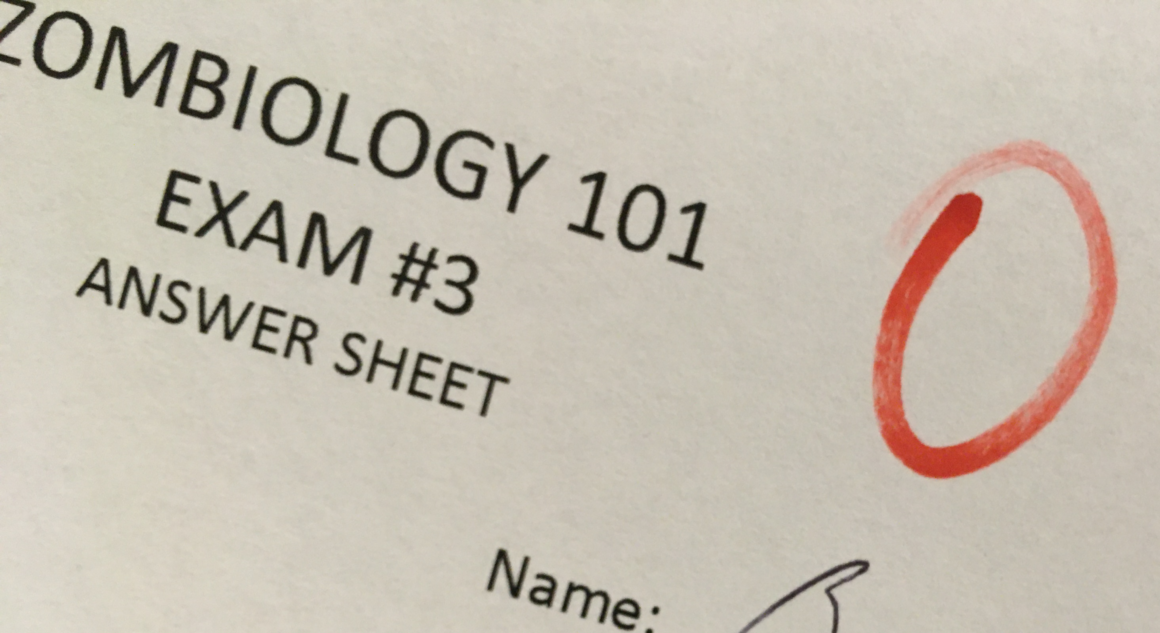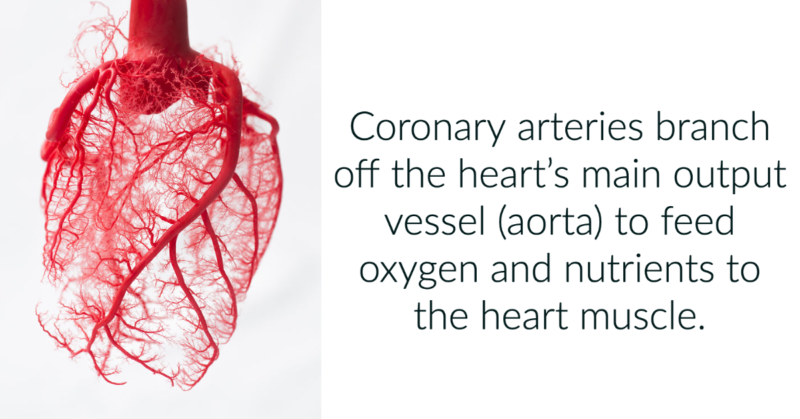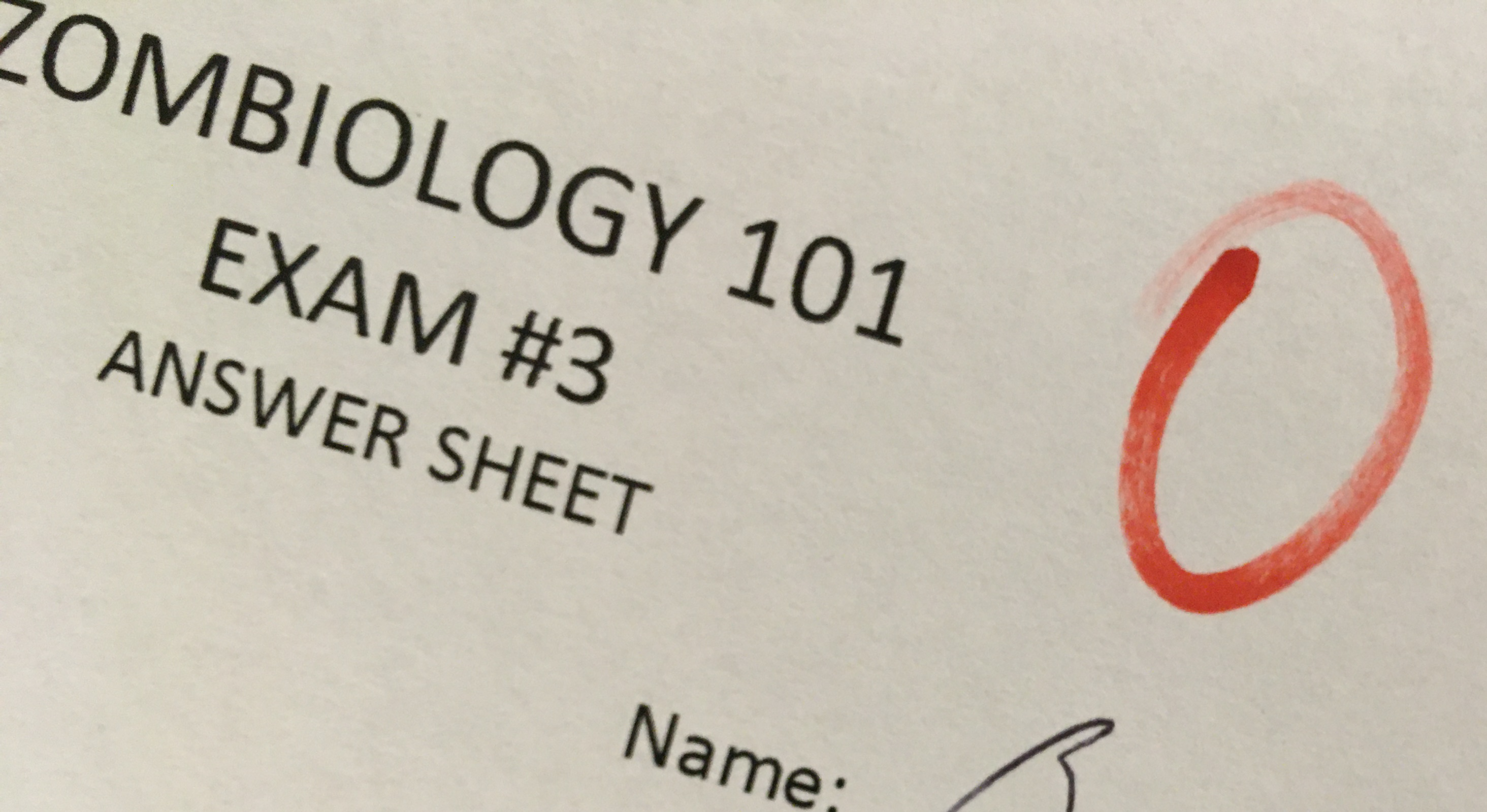Zero’s not been my hero.
Through grade school and college, zeroes used to be something of a monster in my mind. Teachers illustrated just how bad a zero is by demonstrating that if you follow a zero with a score of 100, you still have a failing average. It takes nine straight 100s to get to an A average if you have start with a zero. Zeroes were literally the stuff of nightmares.
Today, I got a zero on my coronary calcium score.

What’s a Coronary Calcium Score?
A coronary calcium score (CCS) is a measurement of how much calcium is in the coronary arteries. The coronary arteries supply the heart muscle with oxygen-carrying blood. The CCS measurement is made using a CT (computed tomography) scan, also know as a CAT scan.

Normally, there are no calcium deposits in the coronary arteries. Calcium gets in the coronary arteries when plaques form. Plaques are areas of abnormal thickening of the blood vessel wall that close down the coronary arteries, reducing blood flow to the heart.
This formation of plaques is, in part, due to inflammation. Inflammation is the body’s normal response to injury and infection. The coronary arteries are small, so a little inflammation can lead to big problems. Plaque formation is typically gradual, so the problems it causes gradually get worse. Exertion or other stress can lead to a rupture of the plaque, which leads to blood clotting in and around the plaque. The blood clot can block the coronary artery suddenly and completely.
The heart muscle that normally gets blood from the blocked artery may die. That’s called a myocardial infarction, also known as an “MI” or heart attack. If the MI affects a significant part of the heart, the heart may fail to pump blood properly, causing death.
A high CCS score means a large amount of plaque is likely to be found in the coronary arteries.
A Zero is Good News on a Coronary Calcium Score
A CCS of zero is good news, but not a big surprise, because a CCS of zero is not unusual. About 6 out of 10 women and 4 out of 10 men who get a CCS before having any symptoms of heart disease have a coronary calcium score of zero (1).
Since it takes years for plaques to form in the coronary arteries, a scan done before the age of 40 in men and 50 in women is not likely to find any calcium unless the person has risk factors such as a history of smoking, high blood pressure, or a family history of heart attacks.
What Does a Calcium Score Have To Do with Intermittent Fasting?
Intermittent fasting has an anti-inflammatory effect. With longer intervals between meals, it also changes how fat is managed (fat metabolism). It’s possible that the anti-inflammatory and metabolic effects of intermittent fasting could reduce or reverse plaque formation.
- Stopping or slowing plaque formation means IF is preventing or delaying heart disease.
- Reducing plaque formation means that IF is successfully treating heart disease.
We don’t know yet if either of these happens.
What Do We Know About Intermittent Fasting and Heart Disease?
Intermittent fasting can reduce risk factors for heart disease, such as elevated blood pressure (2,3,4) and high cholesterol (2, 5, 6).
However, risk factors are not the same as causes. Risk factors are things that are found in people with heart disease more often than in people without heart disease. It’s possible that reducing one or more risk factors may not change the frequency or severity of heart disease at all.
We have seen that reducing high blood pressure (8) and reducing high cholesterol levels (9) can reduce heart disease. This suggests that when intermittent fasting reduces these risk factors, we could see a similar benefit for heart disease.
A few studies have directly connected intermittent fasting with a reduction in heart disease. However, the fasting practices in the groups studied were not very similar to popular intermittent fasting schedules. That means the fasting benefits found don’t necessarily apply. It doesn’t mean they don’t, either—we just don’t know.
In one study (10), the population studied (members of the Church of the Latter-Day Saints, known as Mormons) fast one day per month. That’s a substantially different regimen than a daily time-restricted eating schedule like Fast-5, 5:2 or every-other-day fasting.
Studies have also looked at fasting during Ramadan (11), the Islamic holy month, which is more similar to time-restricted eating. Still, there are big differences between Ramadan fasting (sunrise to sunset for one lunar month) and year-round time-restricted eating. An IF fasting window is usually longer than the 10-14 hour fasting interval in Ramadan. Adding to the difficulty in making comparisons, Ramadan fasting intervals vary with latitude and season.
Can a Coronary Calcium Score be a Part of a Study of One?
A study of one is a series of tests you do on yourself to guide your health choices. Checking these values every year or so can tell you whether your current diet, activity and schedule are improving your health or not. A typical set of study-of-one tests includes:
- Weight
- Waist measurement
- Blood Pressure
A study of one can include blood tests. Ask your doctor to include them with your check-up if they’re not already ordered.
- HS-CRP (measures the system-wide inflammatory state)
- HbA1c (measures the average glucose level of the past few months)
A study of one applies only to you. It avoids reliance on large studies where individual differences can get averaged away. This is important, because for the individual, these differences can be meaningful.
A coronary calcium score is a much better indicator of heart disease than a total cholesterol level or an LDL cholesterol level. However, checking cholesterol at least once is worthwhile to to see if you’re in one of the high-risk categories such as having familial hypercholesterolemia.
So, yes, a coronary calcium score can be a part of your study of one, and it replaces cholesterol testing in my previous suggestions.
Your CCS Is Not Going to Change Quickly
We don’t know if intermittent fasting can reverse heart disease, so we also don’t know how fast it works if it does. If intermittent fasting can slow or reverse heart disease, it is likely to be a very slow process.
Because heart vessel disease takes years to form, it’s reasonable to expect it to take years to go away. too. A consistent intermittent fasting schedule maintained for at least a year, more likely 2-3 years or more, is likely to be needed to see a reduction (if it does work) for those who have a coronary calcium score greater than zero.
If your coronary calcium score is already zero, checking your CCS again in five to ten years may be appropriate. By that time, we may have better tests available.
Even Arthur Agatston, a cardiologist whose team introduced the CT coronary calcium score in 1990 (12) and wrote The South Beach Diet, is recommending intermittent fasting (13).
Hopefully, you can start with a zero and keep it there. Zeros don’t have to be bad. In fact, like this Schoolhouse Rock song says, zeroes can be heroes!
Sources:
- McClelland RL, Chung H, Detrano R, Post W, Kronmal RA. Distribution of coronary artery calcium by race, gender, and age: results from the Multi-Ethnic Study of Atherosclerosis (MESA). Circulation. 2006;113(1):30-37. doi:10.1161/CIRCULATIONAHA.105.580696
- Nematy M,et al. Effects of Ramadan fasting on cardiovascular risk factors: a prospective observational study Nutr J, 11 (2012), p. 69
- Sutton EF,et al. Early Time-Restricted Feeding Improves Insulin Sensitivity, Blood Pressure, and Oxidative Stress Even without Weight Loss in Men with Prediabetes Cell Metab, 27 (2018), pp. 1212–1221
- Wilkinson MJ, Manoogian ENC, Zadourian A, et al. Ten-Hour Time-Restricted Eating Reduces Weight, Blood Pressure, and Atherogenic Lipids in Patients with Metabolic Syndrome. Cell Metab. 2020;31(1):92-104.e5. doi:10.1016/j.cmet.2019.11.004
- Varady KA,Bhutani S,Klempel MC,Kroeger CM Comparison of effects of diet versus exercise weight loss regimens on LDL and HDL particle size in obese adults Lipids Health Dis, 10 (2011), p. 119
- Bhutani S, Klempel MC, Kroeger CM, Trepanowski JF, Varady KA. Alternate day fasting and endurance exercise combine to reduce body weight and favorably alter plasma lipids in obese humans. Obesity (Silver Spring). 2013;21(7):1370-1379. doi:10.1002/oby.20353
- Intermittent fasting works for many — not only for weight loss but also for heart health. Steven Petrow, Washington Post, June 13, 2020
- Ettehad D, Emdin CA, Kiran A, et al. Blood pressure lowering for prevention of cardiovascular disease and death: a systematic review and meta-analysis. Lancet. 2016;387(10022):957-967. doi:10.1016/S0140-6736(15)01225-8
- Chou R, Dana T, Blazina I, et al. Statin Use for the Prevention of Cardiovascular Disease in Adults: A Systematic Review for the U.S. Preventive Services Task Force [Internet]. Rockville (MD): Agency for Healthcare Research and Quality (US); 2016 Nov. (Evidence Syntheses, No. 139.)
- Bartholomew CL, Muhlestein JB, Anderson JL, et al. Association of periodic fasting lifestyles with survival and incident major adverse cardiovascular events in patients undergoing cardiac catheterization [published online ahead of print, 2020 Sep 22]. Eur J Prev Cardiol. 2020;zwaa050. doi:10.1093/eurjpc/zwaa050
- Osman F, Haldar S, Henry CJ. Effects of Time-Restricted Feeding during Ramadan on Dietary Intake, Body Composition and Metabolic Outcomes. Nutrients. 2020;12(8):2478. Published 2020 Aug 17. doi:10.3390/nu12082478
- Agatston AS, Janowitz WR, Hildner FJ, Zusmer NR, Viamonte M Jr, Detrano R. Quantification of coronary artery calcium using ultrafast computed tomography. J Am Coll Cardiol. 1990;15(4):827-832. doi:10.1016/0735-1097(90)90282-t
- Petrow, Steven. Intermittent fasting works for many — not only for weight loss but also for heart health. Washington Post, 2020 June 13.



2 comments
Dr. Herring – Dr. Ford Brewer, MD, has several videos showng the reversal of coronary calcium scores in six – nine months on several patients following an IF program and a low GI, good fat lean protein diet. Dr. Brewer worked at Johns Hopkins before going into private practice.
Dr. James O’Keefe, MD (cardiologist) and several peers published a paper in 2020 or 2021 advocating fasting with a Paleo-Med diet for heart longevity.
Think you’re on to something, sir!
Thanks! If reversibility is seen in 6-9 months, imagine what 6-9 years might do for people with significant blockage!